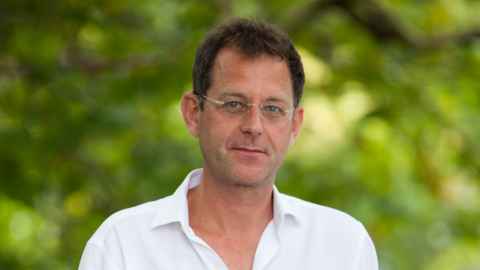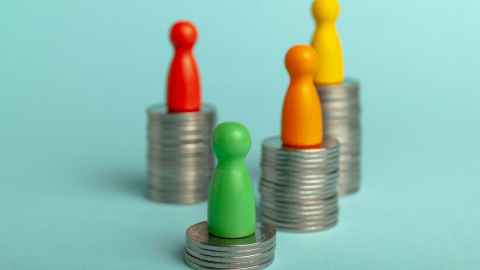The economics of happiness and well-being
17 February 2021
New Zealand has its own world expert on the economics of happiness. Professor Robert MacCulloch says the pandemic is an opportunity to show how we could do a lot better.


In the annual World Happiness Report, New Zealand consistently sits in the top ten countries. Wellington and Auckland regularly rate as within the top 20 cities to live in for happiness.
Well and good, says Professor Robert MacCulloch, a world expert on the economics of happiness and well-being, but he worries about a sense of complacency.
“At the moment most Kiwis do seem happy with how things are going,” says MacCulloch. “But I have frustrations about this because I think we should be more edgy and push ourselves to reform things – to do better.”
MacCulloch, Professor of Macroeconomics at the University of Auckland, is courteous and mild-mannered in person. However he is also an unlikely radical, who poses hard questions about economic orthodoxy. His research papers sit in the top 1 percent of the most highly cited articles worldwide in economics. “The dark side of contentment in New Zealand is that people won’t be motivated to consider changes and this could leave us in bad shape for the future."
With an ageing population, it is going to become harder to provide high quality social and health services.
The consistent happiness rankings are to be cherished, but at the same time, he says: “Our biggest sources of public expenditure, the welfare and health systems, are struggling and creaking. With an ageing population, it is going to become harder to provide high quality social and health services”.
The Covid-19 pandemic has brought the issue of happiness to the fore. In this respect, he says, New Zealand has managed to maintain a normality to life that is the exception worldwide. But MacCulloch says that our relative happiness is fragile.
In 2019, 71 cents in every dollar spent by the Government went to education, health and welfare. These are the big spends, and he thinks that Covid has brought the motivation to bring in genuine reform. “Our welfare system is pretty much the same as when Michael Joseph Savage set it up almost 100 years ago and universal health care systems like ours have changed relatively little.”
Reform and by thinking again from first principles, is needed if New Zealanders are going to retain their high rankings of happiness, since those rankings, as they do in the Scandinavian countries, depend on high quality health and welfare systems.
In the sphere of happiness and well-being economics MacCulloch, a New Zealander who returned home from the United Kingdom in 2011, has built an international reputation. He was invited to join the notable early well-being group convened by Nobel laureate Danny Kahneman at Princeton University; has advised the UK government under David Cameron on how to create well-being measures; and his research informed a major review of the economy in France requested by former president Nicholas Sarkozy. He has the ear of policymakers in Wellington.
Well-being Budget
While broadly supportive of the intent of the Well-being Budgets introduced by the Government, he questions how the concept has been put into practice. His main concern is the lack of clarity. The Well-being Budget is founded on Treasury work that established a comprehensive framework based on the Four Capitals (natural, human, social, and financial and physical) as assets that generate well-being, alongside 12 domains to rank the current state of well-being, with factors like health, housing and income, alongside attributes like cultural identity and social connection. The result is a dashboard with more than 50 indicators.
“When you have so many indicators or measures, some will be going down and some trending up. It becomes a source of political argument as to how the measures are portrayed and that becomes a weakness,” he says.
His answer is to consider just one or two simple broad indicators. “Everyone needs to understand them, and that’s the power of GDP (Gross Domestic Product) as a measure. It’s one number and tells a clear story.”

MacCulloch favours gauging happiness through the kind of question that he has used in research: a simpler question, along the lines of ‘How satisfied are you with your life?’ with a range of clear, graduated responses, from ‘very satisfied, satisfied, not very satisfied to not at all satisfied.’
He calls this type of question “magic” because it avoids a number of hurdles for researchers. “The crucial thing is that to answer the question, you don't need to understand the economy - how it works. You just need a bit of introspection into how you're feeling.”
By correlating the satisfaction responses with other factors, from the inflation rate, to inequality, changes in income, crime rates and environmental standards, MacCulloch and other economists have been able to quantify the price of happiness for everything from wedded bliss to losing your job. This is a different approach to the one traditionally taken by economists, who have traditionally not trusted what people say, preferring “hard data” about what people do.
One can even value environmental benefits using the “happiness approach”. For example, an increase in air pollution as measured by the increase in sulphur dioxide emissions of 1 millionth of a particle per cubic metre of air (1µ/m3) makes people feel worse than a 1.5 percent decline in their household income.
Psychic cost of recession
Those highly cited research papers by MacCulloch used large-scale international studies on life satisfaction and happiness to answer questions about the impact of recessions, unemployment and other economic events.
Their data came from two long-running, large-scale surveys, the Euro-Barometer Survey Series and the United States General Social Survey. Each survey asked people to rate their sense of happiness and satisfaction with life. Combined, the surveys comprise a snapshot of almost 400,000 people’s sense of happiness.
The European survey ran from 1975 to 1992 and the American survey from 1972 to 1994. The surveys simply ask respondents to say whether they are happy, very happy, not too happy or not happy at all. By correlating the responses with vast oceans of publicly available data, MacCulloch and his co-authors were able to estimate the impact of recession and unemployment on levels of happiness.
“The answer is that there are huge psychic costs to recessions,” MacCulloch says. “It’s not just the money that you lose. On top of that people feel stressed and anxious. They become depressed and so there are large additional costs.”
Nor is the impact short-lived, often lasting well beyond the recession. For an individual they calculated that losing your job due to economic recession reduced happiness by 1.3 times the degree of unhappiness resulting from divorce. They found that if a country saw unemployment rise, it led to a negative impact on happiness equivalent to a substantial (5.7 per cent) drop in GDP.
We felt that the economics profession had made a mistake. If you go to your doctor and they ask how you’re feeling, the doctor will take that seriously. Economists didn’t.
This research was controversial because it effectively questioned the then standard view of economists. Traditional economists assumed that if a person lost their job in a recession, they might see it as an opportunity to have a holiday or to re-train and try something different. In the traditional model the sole impact a person faced in losing their job was the temporary loss of wages.
Measured this way, at a national level the cost to an individual of losing their job proved to be tiny, equivalent to, on average, $200 over a year. Re-adjustment to the changed circumstances, a break from work or a new job, was seen to happen quickly.
MacCulloch and his colleagues’ approach was more interested in the longer term psychological and behavioural impacts of economic change and whether those could be quantified. Whereas our usual perspective of economists is of a profession analysing the policies driving the grand measures of the economy, from GDP to the Consumer Price Index (CPI). We do not expect an economist to use data about how we feel. Previously economists had steered clear of emotion because they did not trust what people said.
This had long bothered MacCulloch: “We felt that the economics profession had made a mistake. If you go to your doctor and they ask how you’re feeling, the doctor will take that seriously. Economists didn’t.”
Macroeconomics of happiness
Because the prevailing economic view was that the data was useless, the assumption was that people’s perceptions of happiness and well-being would be random and meaningless. The breakthrough came when MacCulloch and others discovered insightful patterns in the data that showed the impact of economic ups and downs on people’s sense of happiness and satisfaction with life.
By introducing novel phrases such as the ‘macroeconomics of happiness’, MacCulloch helped usher in a human-centred lens to shape economic thinking and policy. This ran counter to the prevailing view of economics that had shaped economic policy in the West since the latter half of the 20th century.
“There was a growing feeling in the 90s that the previous models of economics, particularly the Chicago School in the United States, with their singular focus on GDP and a materialistic view of the world was failing to explain dramatic events in the world economy.”
The Chicago School, the most influential group of economists from the latter part of the 20th century and still so today, included the Nobel-prize winner Milton Friedman. Their work on free markets and trade continues to hold great influence. However MacCulloch says there was growing doubt about these economic models following the 1987 global sharemarket crash and serious economic recession.

To build your career as an academic you need to have your research published. However the prestigious economic journals were published in the United States and edited by economists firmly in the mainstream of American economic thought. MacCulloch and others in the fledgling field now called “happiness economics” found it hard to publish their research.
“This topic was not popular in the United States and largely is still not popular. I think there’s a cultural reason and that is because the maximisation of profit and money and the free market are so central to Americans.”
Dissatisfaction with the power and ubiquity of GDP as the measure of national prosperity is nothing new. MacCulloch refers to a speech by Robert Kennedy, then a presidential candidate, to an audience in Kansas in 1968.
On GDP Kennedy said: “[It] does not allow for the health of our children, the quality of their education or the joy of their play. It does not include the beauty of our poetry or the strength of our marriages, the intelligence of our public debate or the integrity of our public officials. It measures neither our courage, nor our wisdom, nor our devotion to your country. It measures everything, in short, except that which makes life worthwhile.”
Beyond rhetoric, GDP as a measure of prosperity came into question for economists after Richard Easterlin, Professor of Economics at the University of Southern California, published his seminal paper ‘Does Economic Growth Improve the Human Lot’, in 1974. Easterlin can be called the father of the “happiness approach” to economics.
Easterlin’s paper finds that while within a country, rich people do tend to be far happier than the poor, wealthy societies tend to not be happier than poor nations and that, as countries grow wealthier, their level of happiness hits a plateau.
Neuro-economics of the future
MacCulloch says of Easterlin’s work: “The argument goes to the core of what economic life is about on planet Earth. Is the rat race worth it? We’re all struggling to produce more, but is that making us happier?
He distilled that position in a 2003 paper: “There is something fundamentally plausible in the idea that the difference in happiness between primitive man and us is not proportional to the difference in our incomes.” The debate remains live. “Happiness economists” like MacCulloch and Easterlin continue to sit adjacent rather than at the centre of economic policy.
MacCulloch accepts this but says: “I think history is on our side and Easterlin is probably right. Because of that, we may end up winning this. Because of advances in medical science, we are also understanding more and more of what’s happening in the brain. There is even a new field now called neuro-economics”.
One day, he predicts, we will be able to actually measure happiness precisely through our brain’s responses. That will provide the hard data required to change the minds of the economists who right now can only maintain that the measure of our pursuit of happiness largely depends on the size of our bank balance.
GDP vs Happiness
GDP is a single figure encapsulating the total market value of all finished goods and services produced within a country. The world’s largest economy the United States, a rank it has held for some time, recorded an annual GDP figure of about $20,513 trillion, in 2020, closely followed by China at $14,800 trillion. New Zealand sits at 52nd with 193,545 million. The country with the smallest GDP is Tuvalu at about $45 million.
The World Happiness Report is an initiative to rank relative happiness. New Zealand has come in at 8th since 2017. The top three nations in 2020 were Finland, Denmark and Switzerland. The United States is ranked 18th and China 94th.
The World Happiness Report, has produced eight annual editions, based on data from the Gallup World Poll with the analysis undertaken at the Earth Institute at Columbia University under the leadership of economist Jeffrey D Sachs who has worked with the United Nations on the development of the 17 Sustainable Development Goals.
Story by Gilbert Wong
Researcher portrait by Billy Wong
The Challenge is a continuing series from the University of Auckland about
how our researchers are helping to tackle some of the world's biggest challenges.
To republish this article please contact: gilbert.wong@auckland.ac.nz